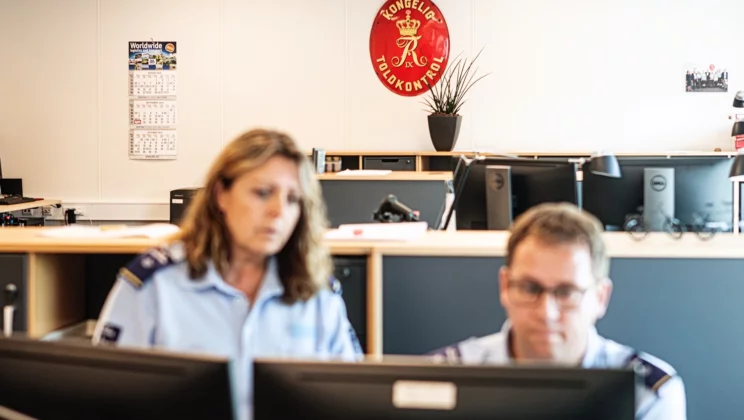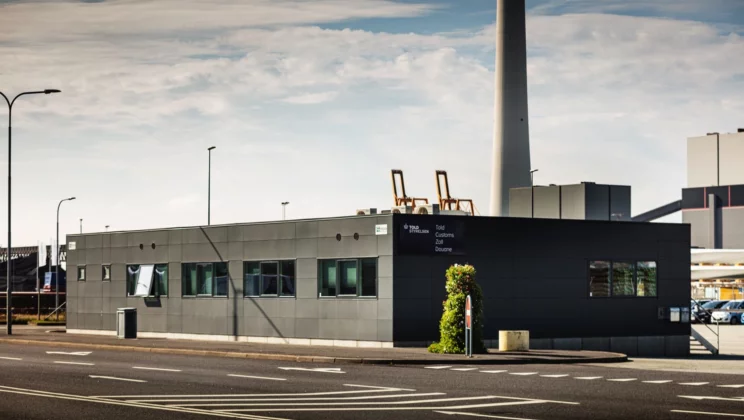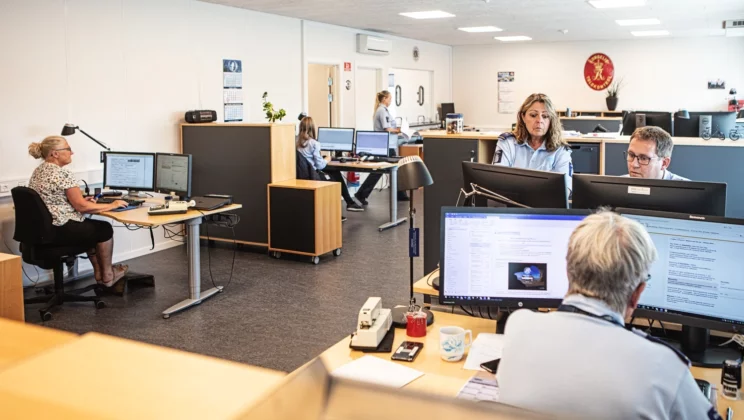Preparations for Brexit have been immense, according to the Danish Minister for Taxation Morten Bødskov. The word from both the Customs Agency and the Veterinary and Food Administration is that they are ready. Getting to that point has required close-knit collaboration, including with Port Esbjerg. “The cooperation between the tax authorities and Port Esbjerg’s business community already plays an important role, and it is essential that it continues in the future,” says the Minister.
Understanding Brexit is very difficult, and so is predicting when and how it will unfold. This has been the situation for three years, even though we are now six months past the original deadline for Britain’s withdrawal from the EU. Following repeated extensions, Britain is now set to leave the EU on 31 October, unless the British parliament and the EU can agree to a withdrawal agreement before then – or unless British Prime Minister Boris Johnson will be forced to go to Brussels to ask for yet another extension, which is the current scenario.
However, the Danish authorities are preparing for a no-deal scenario, according to the Customs Agency and the Veterinary and Food Administration. Morten Bødskov agrees:
“A no-deal scenario leads to uncertainty and the outcome is inherently difficult to predict. The Ministry of Taxation, the National Tax Board and the Customs Agency along with other Danish authorities and national agencies have been working diligently to be able to provide maximum support to our businesses and our citizens before, during and after Britain might withdraw from the EU without an agreement. We must do everything we can to make the transition as smooth as possible for Denmark.”

Busy days lie ahead the employees at The Danish Customs Agency at Port Esbjerg in case of a hard Brexit.
Great Britain becoming a third country
At the Customs Agency, Director of Trade Maren Holm Johansen confirms that the preparations have centred on the consequences of a No Deal.
“We’ve done as much as we can without knowing what the final solution will be. If Britain leaves the EU without an agreement, it will be considered a third country, meaning it will have the same status as current non-EU countries. Fortunately, we already have procedures for trading with this group of countries, so I’m confident that our preparations will help us deal with the situation,” says Holm Johansen.
If Britain becomes a third country, many Danish importers and exporters trading with Britain will be required to follow the general customs and excise regulations governing trade with non-EU countries. Holm Johansen explains that the Customs Agency expects that the number of goods subject to customs duties will increase by 15 per cent.
The Veterinary and Food Administration is also preparing for a no-deal scenario. According to Anna Cecilie de Klauman, Head of Section at the Veterinary and Food Administration’s Centre for International Cooperation, trading with the British market will place special demands on the food authorities.
“Because it is a neighbouring country, trading with Britain involves other types of goods than we normally trade with third countries, including fresh foods, for example, and that means we have to maintain a swift and agile response,” she explains.
The people at the Veterinary and Food Administration have spent a lot of time understanding and charting the current trade flows between Denmark and Britain.
“We’ve had to reach out to our customers to understand the way they export and import goods to and from Britain today and what they need from us,” says de Klauman.
The Veterinary and Food Administration, for example, will have to issue many more export certificates. Currently, it issues 100,000 certificates a year in relation to exports to third countries.
“For Britain alone, we will need to issue 50,000 new certificates per year to cover current export volumes,” explains de Klauman.

At the Danish Costums Agency, a no deal-scenario has been guiding the preparations. This is confirmed by Maren Holm Johansen, Director of Trade at The Danish Costums Agency.
Sleeping with their boots on
Both the Customs Agency and the Veterinary and Food Administration have made huge efforts to involve exporters and importers in their preparations. This is something the business community really appreciates, explains Michael Svane, director of the Confederation of Danish Industry.
“We’re very pleased there has been such a strong focus on providing information and involving industry,” he says, and he continues:
“Our members are very alert to the situation – sleeping with their boots on, so to speak – and there is clearly a definite need for the situation to be clarified. Actually it is also my impression that most companies are preparing for a no-deal outcome, and that they are ready to make things work, also after a hard Brexit.”
The greatest causes of concern are the practical issues. For example, will there be long queues and waiting times, and how would we deal with that?
This is an issue that the Customs Agency is keeping a close eye on. The agency has taken on 40 new customs officers nationwide, the offices at Esbjerg have been extended and staff numbers have been increased from four to seven. In addition, the office has been moved closer to the where the ferry docks, explains Holm Johansen.
Port Esbjerg has spent some DKK 3 million preparing the port for a no-deal scenario, in part to provide more space. The 400–500 daily trailer movements between Esbjerg and Immingham puts a lot of pressure on customs processing, in turn causing waiting time as lorries queue up.
In addition to the Customs Agency’s new offices, the Veterinary and Food Administration has also added to its presence at the port. A no-deal Brexit will trigger new rules for the veterinary border control when dealing with incoming goods from Britain. In preparation, the Veterinary and Food Administration has established a veterinary border control at Esbjerg, explains de Klauman.
From Michael Svane’s perspective, the preparations reflect due care and diligence:
“We’ve been involved in Port Esbjerg’s preparations, and I would like to commend both the Customs Agency and Port Esbjerg for their positive approach. Both the authorities and Port Esbjerg are ready,” says Svane, but he also points out:
“The next big question is: what will the market be like? What kind of volumes will we see? We don’t know.”

The offices of the Danish Costums Agency at Port Esbjerg have been extended and more staff has been engaged as a part of the preparations for a no deal-scenario.
What companies can do themselves to be ready
The message from the authorities and industry organisations alike is: It is essential for companies to prepare for Brexit. While large Danish companies generally have everything in place already for exporting to third countries, small and medium-sized enterprises are much less likely to have procedures in place and any prior experience to draw on, according to Holm Johansen, deputy director at the Customs Agency.
“Some of our customers are unsure whether what they’ve done is enough. I strongly encourage them to study carefully the customs rules for the products they import or export. More specifically, they should make sure they are registered as an importer/exporter and know which product codes are relevant for their company,” she says and explains that the Customs Agency has set up a hotline which companies can call if they have any questions.
Michael Svane explains that the Confederation of Danish Industry has set up a Brexit task force to provide information and organise meetings where members can ask about and discuss any issue, big or small.
“Our task force has developed a Brexit Toolkit that is continuously being updated. It is my impression that this is very helpful to our small and medium-sized members in particular, as Brexit can be quite a challenge for them,” he says, noting that the Foreign Ministry, the Ministry of Business and Industry and the Customs Agency have all prepared useful information about Brexit.
Export certificates not required for six months
Preparing for Brexit is crucial for food businesses, says de Klauman. She encourages the food industry to stay up-to-date by consulting the Veterinarian and Food Administration’s website, but also to look at the information provided by the European Commission.
“For a small business that has never traded with a third country, there are certain things you need to have in place. First of all it is important to register on our website,” she explains.
Fortunately, the British authorities have agreed not to require export certificates for the first six months.
“But it is important to liaise closely with your British business partners. Reach out to them and ask them what they’re doing to prepare and what they expect from you,” says de Klauman, and she adds:
“And let’s not forget that this is a new situation for all of us. We need to be pragmatic and to understand that the only way we will succeed is if we help each other and work together. As a public authority, we are very careful not to make things unnecessarily complicated, and I’m seeing the same kind of support from Port Esbjerg and the other public authorities. Cooperation is essential right now,” she concludes.

The offices of the Danish Costums Agency at Port Esbjerg
Esbjerg is a hub
It is no coincidence that the Customs Agency is expanding at Esbjerg, because DFDS’ regular ferry service to Immingham is Denmark’s largest direct route to Britain.
“The port of Esbjerg is a hub, especially for certain product categories like cars and fresh foods,” says Holm Johansen, who emphasises that she is pleased with the arrangements made by Port Esbjerg which she believes will be enough to accommodate the heightened level of activity.
Minister for Taxation Morten Bødskov stresses that he believes Brexit will consolidate the importance of the port of Esbjerg for Denmark’s international trade.
“The cooperation between the tax authorities and Port Esbjerg’s business community already plays an important role, and it is essential that it continues in the future,” he says.
Fact box: There is help available
- Find guidance, information and FAQs about customs rules at the Danish Customs Agency: https://www.toldst.dk/brexit/
- Or you can call the Customs Agency’s Brexit hotline on tel. +45 72 22 12 12
- Go to this address if you would like to book a meeting with the Customs Agency for guidance on Brexit: https://skat.dk/skat.aspx?oid=2286011
- To find information, guidance, FAQs and video cases on what Brexit means for food businesses, go to the Veterinary and Food Administration’s website: https://www.foedevarestyrelsen.dk/brexit/
- The Confederation of Danish Industry has prepared a Brexit Toolkit – you will find it here: https://www.danskindustri.dk/brexit-toolkit/
Go to overview

